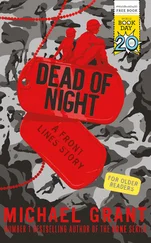“Who,” I demanded. “Father de Céligny?”
“Yes, him.” Dumont crossed himself. The reverent gesture, so earnestly performed, seemed so incongruous in that setting, and from that man, that I fear I laughed.
“Of course they fear him,” I scoffed. “The Indians blame us for everything. These countries, and these poor, ignorant people, are in Lucifer’s thrall. They blame us when there is an outbreak of the pox. They blame us when there is a famine. They blame us when there is a drought. They call the Rite of Baptism water-sorcery. They accuse us of performing witchcraft in our chapels. They call us demons in black robes.”
“No,” Dumont whispered. “They fear de Céligny himself .” He looked all around as though to make sure no one was listening. “They call him Weetigo . An eater of human flesh and a drinker of blood. Human in form, but mji-manidoo, a demon.”
“The Savages do not understand the Rite of Communion,” I explained as patiently as I could, trying not to show my irritation. “They confuse it with their own barbarism, or the barbarism of the Hiroquois.”
“No,” Dumont insisted. “It is more than that. The Savages of which I speak have no quarrel with the Black Robes. But they give the mission of St. Barthélemy in Sault de Gaston a wide berth.”
“Then perhaps those are the Savages who have killed Father de Céligny,” I said in outrage. “If you have information about his fate, Dumont, you will come with me now to Father de Varennes, and you will tell him what you know, or what you have heard from the Savages.”
“I know nothing,” Dumont said. “I have heard nothing. And I will tell Father de Varennes nothing.”
“If you know nothing, my son, then what is your purpose here? Why did you seek me out today?” I asked him in bafflement. “Do you have something to confess? Do you not wish to be granted absolution? I can absolve you, but before I do, you must confess to me.”
Dumont again grew pale. Again, he crossed himself. This time, I did not laugh, for a mask of such dread and tragedy contorted his face that Melpomene herself would have recoiled from it. He seemed suddenly in the throes of a deep and profound spiritual terror. Were he not so clearly a man of a dissolute and profane reputation, I would have even said that he feared that his very soul was in peril from something he had done, or seen. So awful was Dumont’s expression that I had but one thought: that he had, himself, witnessed the awful martyrdom of Father de Céligny at the hands of the Savages and that it had been a most fearsome and terrible death. In his eyes, I found every nightmare that had tormented me, as a young priest in Chartres, about the terrible and agonizing fate that might await me here in New France.
“I need no absolution, Father,” Dumont said. “But perhaps God will grant you the strength and knowledge to conquer what awaits you in St. Barthélemy. We have brought terrible things to New France. There are worse things now walking in the forests at night than the Savages.” He knelt and took my crucifix in his filthy hands, and kissed it. “I will pray for you, Father. Pray for me, also.”
With that, Dumont rose to his feet. He looked around him, and then quickly took his leave from my company by a trail that I knew led to the other side of the post where some of the hivernants kept their canoes. He did not turn or look back as he hurried along his way before disappearing from view behind the trees.
The cold I felt in the wake of Dumont’s leave-taking was due only in part to the sinking of the sun in the sky, or the freezing egress of the coming night. I looked all around me and saw anew the cruel beauty of this wild country of white rivers and black lakes and forests. I saw afresh the savagery here; in nature as in man. Truly, I thought, this is the Devil’s own dominion. Even poor, mad Dumont, in all of his fear and confusion, knew it. There are worse things now walking in the forests at night than the Savages, Father, he’d said. I realized again that we soldiers of God were little more than pinpricks of His light in the vast darkness of this terrible place, and the only beacons by which the Indians might be guided, with Christ’s help, away from Satan and into God’s glorious light. I puzzled over his statement that we, meaning the French, had brought those things here, for surely the light we brought with us has been not only the light of God, but also the light of civilization and knowledge. But ultimately I ascribed the words to his confusion. Perhaps, ultimately, Dumont, after so many godless years among them, had become Savage himself. I swore to pray for him.
And pray I did, that night, though not only for Dumont, or Father de Céligny. Sleep was reluctant to claim me, but eventually it did. It seemed I had barely closed my eyes before Askuwheteau was shaking me awake with the utmost force and impatience to begin the journey upriver to the Mission of St. Barthélemy among the Ojibwa in Sault de Gaston.
We departed in two canoes into a dark grey dawn wreathed in heavy fog and a lowering sky threatening rain. The rains of that first autumn of mine in Trois-Rivières were unlike any I had known as a boy coming to maturity in Beauce. It was of a particular, piercing cold, as though the angels themselves were hurling frozen nails from a celestial height to pierce and humble the proud and unaccustomed. The rivers here also bore no resemblance to any of the three branches of the gentle Eure, near my family’s home near Chartres. Instead, they were wild and serpentine, wending through the rocks and the forests to, it seemed, the very edge of the world.
The Indians are impermeable to hardship in a way that we Europeans cannot fathom. I had of course been made aware of the stoical inurement particular to these people before I left France, but hearing it described by returning priests was entirely different to seeing it in the flesh. The Savage women, too, paddle the canoes alongside their men, as well as carry their own heavy packs along the trails. Their hands are hard and calloused and would be unrecognizable, in France, as belonging to any but the hardest-working peasant.
I sat close behind Askuwheteau in the canoe and tried to match the force of his paddle-stroke. He bent his body to the task as though it were a Sisyphean machine, his back leaning into each stroke. Each time his paddle cut the black water, a perfect white-crested whirlpool spun away in its wake. Try as I might to imitate his movements, my own poor attempts were clumsy and ineffectual. In truth, I felt unmanned, and yet I set myself arduously to my own portion of the labour, remembering well the admonitions of Father de Varennes with regard to the Savages’ measure of me. My life depended in no small part on their protection and goodwill.
Indeed, my position relative to theirs became more and more obvious. While I might be their intellectual and spiritual superior through the agency of my education and my role as Christ’s humble representative in their world of godless ignorance, they were, in every practical sense, my superiors. I saw-and felt-this reality with every stroke of the paddle that took me farther and farther into the wilderness.
We camped that first night by the shore of a nameless lake- nameless to me, though I do not doubt the Savages had a name for it, as they have a name for everything in earthly nature, as well as names for their pantheon of pagan gods and spirits that, I had been told, dwelt not only in the heavens above, but shared the earth with them.
My hands were raw and bleeding from the repetitive friction of wet skin against wood after that first long day’s paddle. Sitting about the campfire that night with the Indians, one of the older women, Hausisse, noticed my pain. From one of her packs, she withdrew a greasy poultice. She started to apply it to my wounds. When I pulled back and uttered some instinctive protest, she grasped my wrist as firmly as if I were an unruly child and rebuked me in Algonquian. Then she applied the poultice even more vigorously upon my wounds. In truth, the sting in my hands from the paddle began almost immediately to subside, a cooling sensation spreading across my palms, and indeed everywhere the poultice touched my skin.
Читать дальше












